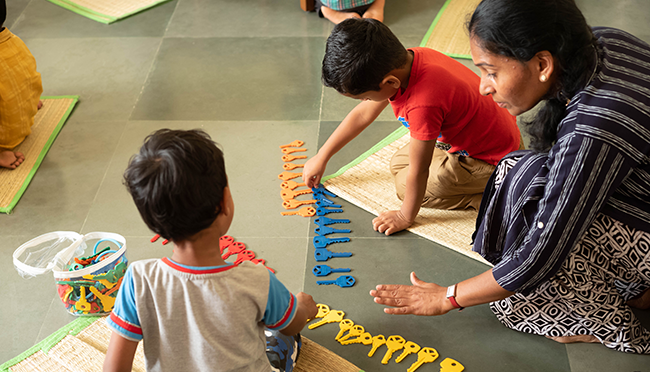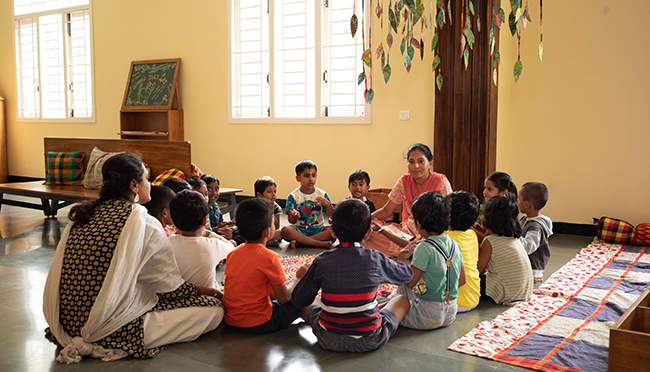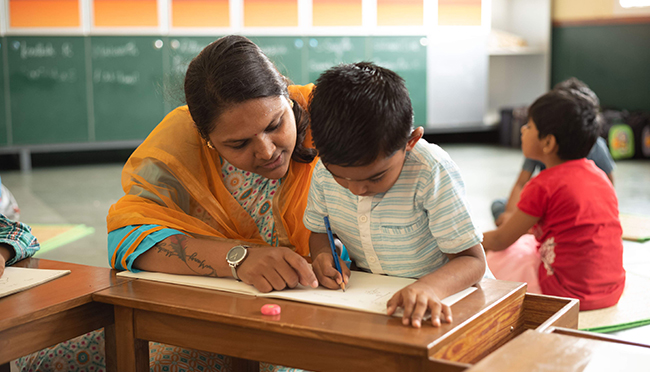At Chettinad Harishree Vidyalayam, the pedagogy followed is the Montessori and Waldorf method , nurturing the intellectual, artistic, imaginative and creative abilities of every learner. The curriculum is based on the Cambridge framework which caters to a holistic development of every child. Through the program, the aim is to encourage learners to act independently, make their own choices and develop a sense of self-worth.
The environment provides a child-centric approach, promoting multi-sensorial and nature based learning.
Our Pre primary program caters to PP1, PP2 and PP3 for young learners aged 2..6 to 5.6 years.
The Pre primary years program has a maximum of 25 children, with one teacher and one support staff (Akka) facilitating each class. The curriculum focuses on the following key areas : Exercises of Practical Life, Sensorial, Language and Numeracy.
Our mornings commence with circle time sessions that are theme – based offering significant opportunities for children to build self awareness ,confidence and social interaction by learning to listen and share their thoughts and feelings.
Classrooms are well-resourced with age-appropriate materials that are carefully curated to support hands-on learning and exploration.
Art and Craft, Music, Yoga, Library sessions, Sand-play, Water-play, Sensorial path, and Outdoor play, are integrated to provide a diverse and exploratory learning experience.
Celebrations, field trips, and carnivals are an integral part of the three-year learning journey, offering ample opportunities for creative expression and joyful experiences.
Exercises of Practical Life (EPL)
Exercises of Practical Life provides a scope and sequence for the everyday routines and practices. They help to develop motor control and coordination, independence, concentration, and a sense of responsibility. The two main areas of development in EPL are: care of self, and care of the environment.
Rolling and unrolling of the mat, pouring of grains from one container to another, opening and closing of containers, making of buttermilk and lime juice, cutting carrots, pounding roasted Bengal gram, washing hands and washing utensils are some of the activities offered under EPL. These skills, when taught early in life, allow children to believe in themselves as well as develop the self-discipline needed for success throughout their lives.
Sensorial
Sensorial Activities are utilized in the classroom to help children organise the varied impressions received through their senses: sight, listening, touch, taste, and smell. Materials like Cylinder Blocks, Long Rods, Pink Tower, Colour Tablets and Noise Boxes are some of the materials kept in the sensorial corners The materials follow a developmental succession and are scientific and precise.Control of error is inbuilt in the materials, this helps the child in self correction and thereby develops the child’s confidence and become independent. The child explores and discovers the concepts they have learnt through exploratory activities. Working with all the sensorial materials prepares the child cognitively for reading and writing.
Language
All children have the innate ability to develop a language. Children learn language through engaging experiences such as storytelling, reciting rhymes, pretend and play, and discussions using picture cards. These activities enrich their vocabulary and phonemic awareness, setting the stage for them to read and write well later on.
In each classroom, a reading corner is designed where children can develop their reading skills as well as let their imaginations soar. Through stories, they also learn how to use words to share their thoughts and feelings, making language a tool for connecting with others.
Children are encouraged to express their ideas orally as well as in writing. They are engaged in age-appropriate and relevant activities that help them understand and appreciate the world.
Numeracy
Developing mathematical skills and spatial awareness is one of the most important skills to help children make sense of the world around them. Children learn to recognize shapes, size, position, and the spaces that they are engaged in.
The abstract subject of Mathematics is given a concrete form through the materials provided in the classroom. When children are introduced to numbers, the quantity is given first and then the abstract concept of symbols. Children gradually learn to associate the symbols with the abstract concept. The child is introduced to the decimal system of numeration followed by the basic operations namely addition and subtraction,introduced through parallel exercises.
The Arithmetic materials which are the means of development helps the child to get clarity of the concept. When these concepts get internalised it leads the child to carry out these operations independent of the material. Through this process children are encouraged to learn independently.
Social Emotional skills
Weaving SEL into every day, our circle time activities along with mindfulness activities such as Mindful Mondays, Tasty Tuesdays, Wonderful Wednesdays, Thriving Thursdays, and Fun Fridays nurture children’s social and emotional learning, laying the foundation for their well-being and success in all areas. Children connect with themselves, their peers and teachers. It helps them to develop social learning and friendships, regulates their emotional responses, respect and respond to the needs of others and to develop self esteem and confidence.
Green Education
The emphasis in the early years is to encourage children to develop their sense of wonder. Through Nature Based learning, children are encouraged to build empathy and connect with the Natural world.
Transition from Pre Primary to Primary
Over the period of 3 years at Pre Primary, children develop in a safe and nurturing space. At the end of pre primary years, the transition process is meticulously planned and thoughtfully supported in order to ease them into the new environment when they move into the Primary years. This is followed by a detailed discussion between the primary teachers with the pre primary teachers to understand the child and plan the curriculum for the upcoming year. The curriculum ensures a smooth transition taking into account the literacy and numeracy skills learnt in Pre Primary.
Observations of individual children’s overall development is shared with the primary teachers to understand each child better and to support the children in their progress. During their early days at the Primary, the pre primary Acharyas visit them to connect with them, make them feel comfortable and at ease.
A homeroom system is followed in the Primary, to maintain similar trust and bonding between the acharyas and the children as they had experienced in the Pre Primary.




All images and text @ Copyright Chettinad Hari Shree Vidyalayam, Coimbatore. All Rights Reserved.